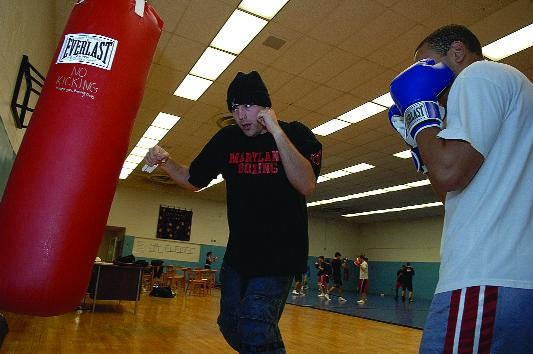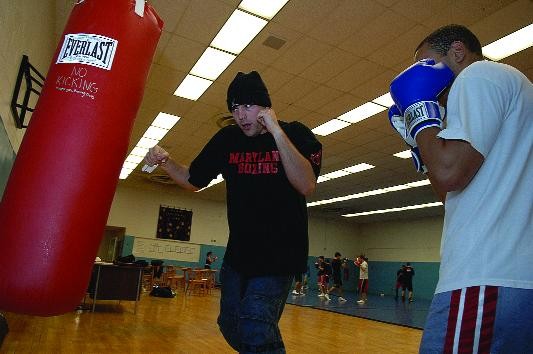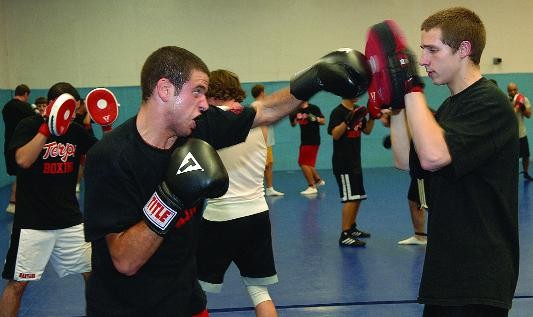One, two, three, four. One more set.
More than 120 taped fists respond in rhythm to the sharp commands. Sweat rolls down the faces of men and women in the gym, whose punches and jabs are not quite as crisp and whose gloves are not held quite as high as they were an hour ago.
As fatigue sets in, the members of the Terps Boxing Club finish up their workout and get water with very satisfied but tired looks on their faces. Their boxing interest, which for many started only a year ago, consists of two workouts a week in the beaten padded gym of the Health and Human Performance center – which also houses desks, two punching bags and storage lockers.
It’s a far cry from a boxing career that began in a gym in western Pennsylvania, peaked in the bright lights of Las Vegas, and now resides under a fluorescent glow. It belongs to Luke Runion, the one-time intercollegiate heavyweight champion who has brought boxing from a black-and-white university memory into a colorful club on the campus that has grown from 20 members to well over 100.
“Boxing is just like life, you get as much out of it as you put into it,” Runion said of his dedication to the sport.
Penn State, where Runion began college, has a thriving boxing club program. During his second year in organized boxing at the university, Runion won the intercollegiate heavyweight championship in a match held in Las Vegas in April 2003.
Despite reaching the pinnacle of intercollegiate success, he walked away from Penn State after his sophomore year when his coach retired. After taking a year off, Runion, a Leonardtown, Md., resident, decided to enroll at this university to start boxing competitively at the intercollegiate level again.
The only problem was boxing was dropped as a varsity sport in 1955, and there were no signs of a club team.
That’s when Runion threw the first punch, starting with meetings in the basement of Cole Field House.
“I saw an advertisement for a boxing club in LeFrak and to contact Big Luke, and we just kind of met and it took off from there,” said Michael Poling, a junior criminology and criminal justice major and vice president of the Boxing Club.
“The Boxing Club was Luke’s brain child,” said Matt Steenhoek, a 2005 graduate.
The final part of Runion’s vision is to bring competitive boxing to the university. Currently, his plan is to try to host the intercollegiate regional tournament in March at Ritchie Coliseum. After meeting with Linda Clement, vice president for student affairs, and Jay Gilchrist, director of Campus Recreation Services, Runion began work on a proposal for an all-day boxing show.
Although he wanted to bring professional boxing to the university, Runion was turned down.
“I think Luke has done an incredible job over the last two years. There is evidence of real student interest,” said Clement. “But we want to be sure, in keeping with our institutional mission … this is not a place for professional sports.”
Runion feels the plan of hosting the regional tournament would still appeal to the student body and hopefully gain approval from administrators, who he feels may be concerned with the dangerous stigma the sports carries.
According to www.usaboxing.org, the official website for the Olympic boxing team, amateur boxing is safer than professional boxing because mouth guards must be worn, as well as shock-absorbent head gear and a shirt. Amateur boxing gloves are designed to absorb rather than transmit the force of a punch, unlike professional boxing gloves.
Many critics of boxing cite the danger of the sport, but a 1996 report from the National Safety Council on the most dangerous sports only ranked amateur boxing at 23.
“I want it so they don’t see it as a brutal sport, but rather as Olympic-style boxing, where you try to score more points by touching the other fighter rather than as a slugfest,” Runion said.
Gilchrist expressed concern about the medical and overall costs that would be associated with an event the size Runion is considering.
Gilchrist also said he had talked to other schools and found the turnout was low for boxing events except for at the Naval Academy, which has a rich history in the sport.
“I’ve been here for 25 years without any sort of a boxing program,” said Gilchrist. “A match is possible only if it meets legal and technical standards.”
Despite the challenge of organizing boxing matches, the club members remain positive about the event’s potential.
“If it’s on the day we want, it’ll blow up. The interest from the people that I’ve brought it up to has been amazing,” said Elvin Fortuna, a junior philosophy major and secretary of the Boxing Club.
“The fights here at Maryland should sell out, no problem,” said Steenhoek. “It’s just a matter of getting the word out. I think it’ll be fantastic.”
Contact reporter Sam Duvall at sports@dbk.umd.edu.
mike frantel—THE DIAMONDBACK Former intercollegiate national boxing champion Luke Runion (left) left Penn State to instruct boxers at this university. His eligiblity has expired.





